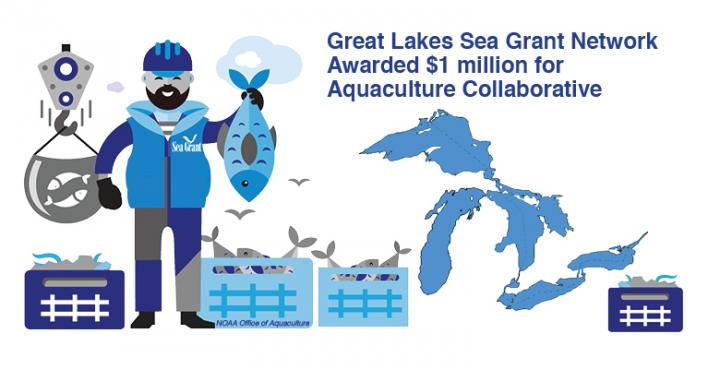
Credit: NOAA/Minnesota Sea Grant
Duluth, Minnesota — Great Lakes states are not keeping pace with increases in consumer demand for fish and seafood, which is contributing to a $14 billion national seafood trade deficit. Minnesota Sea Grant will lead six Sea Grant programs from the Great Lakes region in a three-year, $1 million aquaculture collaborative project to address this issue.
The Great Lakes Aquaculture Collaborative is one of 42 research projects and collaborative programs totaling $16 million aimed at advancing sustainable aquaculture in the United States funded by the National Sea Grant Office. The awards are dependent on the availability of federal funds.
“Our primary goal is to better understand the potential for increased aquaculture activity in the Great Lakes region,” said project leader and Minnesota Sea Grant Director John A. Downing. “That increased activity must be environmentally responsible, competitive and sustainable through science-based initiatives and collaboration among aquaculture experts, industry representatives and potential consumers”
The Great Lakes Aquaculture Collaborative is funded by National Sea Grant’s Advanced Aquaculture Collaborative Program. This program seeks to build the capacity of Sea Grant and its partners to advance aquaculture in areas where a foundation of knowledge and activity currently exists but where significant barriers to sustainable domestic marine and Great Lakes aquaculture remain.
“We recognize that sport, commercial, and tribal fishing in the Great Lakes region must be protected based on their social, cultural and economic importance” said project co-leader and Minnesota Sea Grant Fisheries and Aquaculture Specialist Don Schreiner. “This project will focus on aquaculture production that does not directly impact waters of the Great Lakes or the Great Lakes region.”
In the first phase of the Great Lakes Aquaculture Collaborative project, the team will establish a formal structure to coordinate the collaborative that includes state-level advisory groups and regional liaisons. The team will develop websites, listservs and webinars to share and disseminate the best available science information. An aquaculture event will be planned each year of the project for sharing new research, data and information with a focus on delivery of relevant material to the aquaculture industry.
In the second phase, the team will evaluate consumer perceptions, demand and willingness to pay for aquaculture products. Interviews and surveys will be conducted among producers to determine what type of research would be most useful for the Great Lakes aquaculture industry. The team will also conduct a policy analysis and gather stakeholder input to identify which barriers most constrain industry growth in the Great Lakes Basin.
The culmination of the project will be identification of specific strategies, presented as recommendations to the Great Lakes aquaculture industry, on how to overcome challenges and how to potentially leverage opportunities.
“These investments are critical to advancing United States aquaculture in sustainable, thoughtful ways using the best science and talent across the country,” said National Sea Grant Director Jonathan Pennock. “With our 2019 investments, we can address critical gaps in information, understanding and connectivity of science to industry.”
The economic benefit of Sea Grant’s 2018 investment in aquaculture nationwide was $65 million, including sustaining or creating 841 jobs and 345 businesses. In 2019, Sea Grant employed or partially funded 111 professionals working on aquaculture around the country to study, communicate, identify needs or transfer research to industry members and the public.
These investments by the National Sea Grant Office are consistent with Sea Grant’s focus area of sustainable fisheries and aquaculture, the Sea Grant Network 10-year Aquaculture Vision and support the aquaculture goals of the National Oceanic and Atmospheric Administration and the Department of Commerce.
“We are excited to leverage the expertise of staff and researchers including applied economists, aquaculture experts, educators, communicators, and fisheries specialists from Sea Grant programs in Indiana-Illinois, Michigan, New York, Ohio, Pennsylvania, Wisconsin, and Minnesota,” said Downing.
###
The University of Minnesota Sea Grant is part of the National Sea Grant College Program — a network of 33 Sea Grant science, education and outreach programs located in every coastal and Great Lakes state, Puerto Rico, Lake Champlain and Guam — administered by the National Oceanic and Atmospheric Administration.
ADDITIONAL INFORMATION:
- NOAA funding opportunity: https:/
/ www. fisheries. noaa. gov/ grant/ advanced-aquaculture-collaborative-programs - Descriptions of the 42 aquaculture projects funded by NOAA/National Sea Grant
CONTACTS:
- Minnesota Sea Grant
- John Downing, Director, Minnesota Sea Grant; Professor of Biology, Department of Biology and Scientist, Large Lakes Observatory, University of Minnesota Duluth, [email protected], 218-726-8715
- Donald Schreiner, Minnesota Sea Grant; Fisheries and Aquaculture Specialist, [email protected], 218-726-8106
- Marie Thoms, Communication Manager, Minnesota Sea Grant, [email protected], office: 218-726-8710, mobile: 907-460-1841, @MNSeaGrant. http://www.
seagrant. umn. edu
Media Contact
Marie Thoms
[email protected]
Original Source
http://www.




